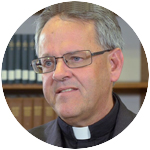
Father Thomas Dailey, O.S.F.S.
Talk of “conversion” sounds familiar. Believers know they need it, even while struggling to accomplish it.
Now we hear that entire parishes also need it! A new Vatican document calls for “The Pastoral Conversion of the Parish Community in the Service of the Evangelizing Mission of the Church.”
The impetus for this derives from the new reality in which parishes exist. Cardinal Beniamino Stella points out that the church now labors under a scarcity of priests, that territorial boundaries of parishes have changed or “disappeared” altogether, and that increased mobility and digital dependence have redefined our cultural sense of space and time.
The instruction delineates the church’s response. According to Msgr. Andrea Ripa, “this involves a certain reorganization in the way the pastoral care of the faithful is exercised, so as to foster a greater co-responsibility and collaboration among all the baptized.”
[hotblock]
The document appears to focus much more on the former than the latter. Approximately two-thirds of it deals with organizational matters, of interest more to diocesan officials than to people in the pews. Specific mention of co-responsibility appears only twice, with reference to a parish’s finance council (n. 106) and its pastoral council (n. 113). (Ironically, the latter is not canonically required in parishes, despite Pope Francis’s exclamation of their necessity [n. 108].)
But real conversion first requires a change in mentality – on the part of clergy and laity alike.
Generally speaking, parishes today are no longer primary gathering places (no. 15); they have lost their “existential” space in the local community (no. 16). They seem now to be perceived as merely a site for religious events and services (no. 34) whose activities are directed primarily, if not entirely, by the clergy (no. 38).
Consequently, they risk becoming “self-referential and fossilized,” thereby stifling the “spiritual dynamic of evangelization” that is a parish’s real mission (no. 17).
To counter these trends, pastoral conversion looks to engage “the whole community, and not simply the hierarchy, (as) the responsible agent of mission” in the parish, “since the church is identified as the entire People of God” (no. 38).
Pastoral conversion for the clergy entails the (renewed) recognition that they remain “at the service of the parish, and not the other way around” (no. 69). Identified as a fundamental reference point (no. 62) and also the legal representative of a parish (no. 67), pastors are now challenged to discern and direct the dynamic of co-responsibility, whereby “each member of the community feels responsible and directly involved in caring for the needs of the church in a variety of ways and in a spirit of solidarity” (no. 40).
Meeting that challenge begins with a seminary formation that inculcates the distinctiveness of the priestly vocation within the context of the common vocation of all the baptized. As Dr. John Cavadini recently explained, “the priesthood of the ordained is a share in Christ’s priesthood different in kind, not in degree, from that of the baptized.”
Learning that distinction also impacts the laity, for whom a pastoral conversion is likewise challenging.
For generations, believers have considered themselves, some quite proudly, as “members” of their parish. This outlook views the local church as merely an association of the like-minded, owing to family or neighborhood ties. In this mind-set, parishioners become “receivers” of the programs and services offered there.
Even where some laity lead parish activities, the majority of the faithful still sense they “belong to” rather than “are” the parish.
Changing that mentality also requires education in ecclesiology. Even more, pastoral conversion calls for new action.
For the laity, this means choosing to step up and get involved. Complaining that “the church” or “the parish” should do things differently, without responsibly acting to help bring about change, only highlights the mentality that mistakes membership for communion.
For the clergy, fostering that communion means more than simply enlisting lay volunteers. Generating active participation and investment in parish life requires sharing not only responsibility but authority, thereby enabling and ennobling the faithful to do what they do best.
Bringing about this necessary pastoral conversion will be a collective challenge. Yet it is who we are called to be and what we are called to do. The parish of the past will not serve the church of the future.
Rather, as the instruction concludes, intentional collaboration and real co-responsibility among clergy and laity “will orient (the parish) effectively toward an evangelising mission, the task of the entire People of God, that walks through history as the ‘family of God’ and that, in the synergy of its diverse members, labours for the growth of the entire ecclesial body” (no. 123).
***
To inaugurate the new year of formation, St. Charles Borromeo Seminary will host The Cardinals’ Forum on the topic of “Co-Responsibility in the Church’s Being and Action in Parish Life.” The panel discussion on Aug. 25 at 7 p.m. in the Vianney Auditorium features the seminary’s three endowed professors along with Archbishop Nelson Perez. The event is open to the public with free admission and practicing necessary health protocols (face coverings, social distancing, etc.).
***
Father Thomas Dailey, O.S.F.S. is the John Cardinal Foley Chair of Homiletics and Social Communications at St. Charles Borromeo Seminary, Wynnewood, and a research fellow for the Catholic Leadership Institute in Wayne.
PREVIOUS: How Catholic organizations are weathering the pandemic
NEXT: ‘Hamilton’ tells how to save our flawed America


Share this story